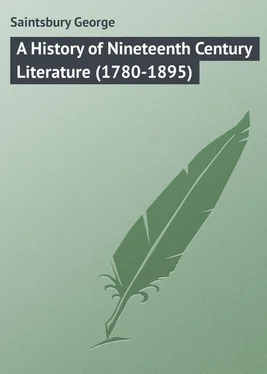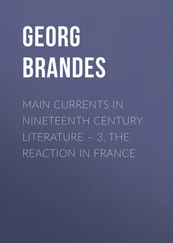George Saintsbury - A History of Nineteenth Century Literature (1780-1895)
Здесь есть возможность читать онлайн «George Saintsbury - A History of Nineteenth Century Literature (1780-1895)» — ознакомительный отрывок электронной книги совершенно бесплатно, а после прочтения отрывка купить полную версию. В некоторых случаях можно слушать аудио, скачать через торрент в формате fb2 и присутствует краткое содержание. ISBN: , Жанр: foreign_prose, на английском языке. Описание произведения, (предисловие) а так же отзывы посетителей доступны на портале библиотеки ЛибКат.
- Название:A History of Nineteenth Century Literature (1780-1895)
- Автор:
- Жанр:
- Год:неизвестен
- ISBN:http://www.gutenberg.org/ebooks/31698
- Рейтинг книги:5 / 5. Голосов: 1
-
Избранное:Добавить в избранное
- Отзывы:
-
Ваша оценка:
- 100
- 1
- 2
- 3
- 4
- 5
A History of Nineteenth Century Literature (1780-1895): краткое содержание, описание и аннотация
Предлагаем к чтению аннотацию, описание, краткое содержание или предисловие (зависит от того, что написал сам автор книги «A History of Nineteenth Century Literature (1780-1895)»). Если вы не нашли необходимую информацию о книге — напишите в комментариях, мы постараемся отыскать её.
A History of Nineteenth Century Literature (1780-1895) — читать онлайн ознакомительный отрывок
Ниже представлен текст книги, разбитый по страницам. Система сохранения места последней прочитанной страницы, позволяет с удобством читать онлайн бесплатно книгу «A History of Nineteenth Century Literature (1780-1895)», без необходимости каждый раз заново искать на чём Вы остановились. Поставьте закладку, и сможете в любой момент перейти на страницу, на которой закончили чтение.
Интервал:
Закладка:
George Saintsbury
A History of Nineteenth Century Literature (1780-1895)
PREFACE
In the execution of the present task (which I took over about two years ago from hands worthier than mine, but then more occupied) some difficulties of necessity occurred which did not present themselves to myself when I undertook the volume of Elizabethan Literature, or to my immediate predecessor in grappling with the period between 1660 and 1780.
The most obvious and serious of these was the question, "What should be done with living authors?" Independently of certain perils of selection and exclusion, of proportion and of freedom of speech, I believe it will be recognised by every one who has ever attempted it, that to mix estimates of work which is done and of work which is unfinished is to the last degree unsatisfactory. I therefore resolved to include no living writer, except Mr. Ruskin, in this volume for the purpose of detailed criticism, though some may be now and then mentioned in passing.
Even with this limitation the task remained a rather formidable one. Those who are least disposed to overvalue literary work in proportion as it approaches their own time will still acknowledge that the last hundred and fifteen years are fuller furnished than either of the periods of not very dissimilar length which have been already dealt with. The proportion of names of the first, or of a very high second class, is distinctly larger than in the eighteenth century; the bulk of literary production is infinitely greater than in the Elizabethan time. Further, save in regard to the earliest subsections of this period, Time has not performed his office, beneficent to the reader but more beneficent to the historian, of sifting and riddling out writers whom it is no longer necessary to consider, save in a spirit of adventurous or affectionate antiquarianism. I must ask the reader to believe me when I say that many who do not appear here at all, or who are dismissed in a few lines, have yet been the subjects of careful reading on my part. If some exclusions (not due to mere oversight) appear arbitrary or unjust, I would urge that this is not a Dictionary of Authors, nor a Catalogue of Books, but a History of Literature; and that to mention everybody is as impossible as to say everything. As I have revised the sheets the old query has recurred to myself only too often, and sometimes in reference to very favourite books and authors of my own. Where, it may be asked, is Kenelm Digby and the Broad Stone of Honour ? Where Sir Richard Burton (as great a contrast to Digby as can well be imagined)? Where Laurence Oliphant, who, but the other day, seemed to many clever men the cleverest man they knew? Where John Foster, who provided food for the thoughtful public two generations ago? Where Greville of the caustic diaries, and his editor (latest deceased) Mr. Reeve, and Crabb Robinson, and many others? Some of these and others are really neiges d'antan ; some baffle the historian in miniature by being rebels to brief and exact characterisation; some, nay many, are simply crowded out.
I must also ask pardon for having exercised apparently arbitrary discretion in alternately separating the work of the same writer under different chapter-headings, and grouping it with a certain disregard of the strict limits of the chapter-heading itself. I think I shall obtain this pardon from those who remember the advantage obtainable from a connected view of the progress of distinct literary kinds, and that, sometimes not to be foregone, of considering the whole work of certain writers together.
To provide room for the greater press of material, it was necessary to make some slight changes of omission in the scheme of the earlier volumes. The opportunity of considerable gain was suggested in the department of extract – which obviously became less necessary in the case of authors many of whom are familiar, and hardly any accessible with real difficulty. Nor did it seem necessary to take up room with the bibliographical index, the utility of which in my Elizabethan volume I was glad to find almost universally recognised. This would have had to be greatly more voluminous here; and it was much less necessary. With a very few exceptions, all the writers here included are either kept in print, or can be obtained without much trouble at the second-hand bookshops.
To what has thus been said as to the principles of arrangement it cannot be necessary to add very much as to the principles of criticism. They are the same as those which I have always endeavoured to maintain – that is to say, I have attempted to preserve a perfectly independent, and, as far as possible, a rationally uniform judgment, taking account of none but literary characteristics, but taking account of all characteristics that are literary. It may be, and it probably is, more and more difficult to take achromatic views of literature as it becomes more and more modern; it is certainly more difficult to get this achromatic character, even where it exists, acknowledged by contemporaries. But it has at least been my constant effort to attain it.
In the circumstances, and with a view to avoid not merely repetition but confusion and dislocation in the body of the book, I have thought it better to make the concluding chapter one of considerably greater length than the corresponding part of the Elizabethan volume, and to reserve for it the greater part of what may be called connecting and comprehensive criticism. In this will be found what may be not improperly described from one point of view as the opening of the case, and from another as its summing up – the evidence which justifies both being contained in the earlier chapters.
It is perhaps not improper to add that the completion of this book has been made a little difficult by the incidence of new duties, not in themselves unconnected with its subject. But I have done my best to prevent or supply oversight.
CHAPTER I
THE END OF THE EIGHTEENTH CENTURY
The period of English literary history which is dealt with in the opening part of the present volume includes, of necessity, among its most illustrious names, not a few whose work will not be the subject of formal discussion here, because the major part of it was done within the scope of the volume which preceded. Thus, to mention only one of these names, the most splendid displays of Burke's power – the efforts in which he at last gave to mankind what had previously been too often devoted to party – date from this time, and even from the later part of it; while Gibbon did not die till 1794, and Horace Walpole not till 1797. Even Johnson, the type and dictator at once of the eighteenth century in literary England, survived the date of 1780 by four years.
Nevertheless the beginning of the ninth decade of the century did actually correspond with a real change, a real line of demarcation. Not only did the old writers drop off one by one, not only did no new writers of utterly distinct idiosyncrasy (Burns and Blake excepted) make their appearance till quite the end of it, but it was also marked by the appearance of men of letters and of literary styles which announced, if not very distinctly, the coming of changes of the most sweeping kind. Hard as it may be to exhibit the exact contrast between, say, Goldsmith and men like Cowper on the one side and Crabbe on the other, that contrast cannot but be felt by every reader who has used himself in the very least to the consideration of literary differences. And as with individuals, so with kinds. No special production of these twenty years may be of the highest value; but there is a certain idiosyncrasy, if only an idiosyncrasy of transition – an unlikeness to anything that comes before, and to anything, unless directly imitated, that comes after – which is equally distinguishable in the curious succession of poetical satires from Peter Pindar to the Anti-Jacobin , in the terror-and-mystery novels of the school of Mrs. Radcliffe and Monk Lewis, in the large, if not from the literary point of view extremely noteworthy, department of politics and economics which in various ways employed the pens of writers so different as Moore, Young, Godwin, Priestley, Horne, Tooke, Cobbett, and Paine.
Читать дальшеИнтервал:
Закладка:
Похожие книги на «A History of Nineteenth Century Literature (1780-1895)»
Представляем Вашему вниманию похожие книги на «A History of Nineteenth Century Literature (1780-1895)» списком для выбора. Мы отобрали схожую по названию и смыслу литературу в надежде предоставить читателям больше вариантов отыскать новые, интересные, ещё непрочитанные произведения.
Обсуждение, отзывы о книге «A History of Nineteenth Century Literature (1780-1895)» и просто собственные мнения читателей. Оставьте ваши комментарии, напишите, что Вы думаете о произведении, его смысле или главных героях. Укажите что конкретно понравилось, а что нет, и почему Вы так считаете.












